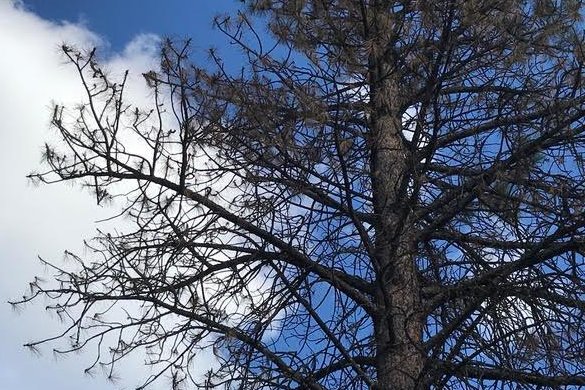1 of 2 | Oregon might restrict use of aminocyclopyrachlor, or ACP, after the chemical was blamed for the slow death of almost 2,000 ponderosa pine trees that were more than a century old. Amanda Waldroupe/UPI
March 18 (UPI) -- Oregon could become the first state to strictly limit the use of the herbicide aminocyclopyrachlor, or ACP, after the chemical was blamed for the slow death of almost 2,000 ponderosa pine trees that were more than a century old.
"It's showing that this chemical is inherently dangerous and should not be on the market ... if it is going to cause such damage to trees," said Drew Toher, the policy director of Beyond Pesticides, a Washington, D.C.-based environmental organization.
The Oregon Department of Agriculture has proposed a new rule, to take effect March 25, that would prohibit spraying ACP along rights of way and in natural and restoration areas, protected sage grouse habitat and wetlands.
Spraying areas where tree roots may be present also would be prohibited, along with aerial spraying.
In one exception, ACP could be sprayed once a year to control invasive weeds, and only in "spot treatments" no bigger than 9 square feet, or 5 percent of an acre.
Commonly sprayed alongside roads to control weeds and vegetation, ACP is found in several pesticides regulated by the Environmental Protection Agency. It is not commercially available and applicators must have a state-issued license.
The EPA banned ACP use in residential areas after Imprelis, which contains the chemical, was shown to damage or kill shrubs and trees, including Norway Spruce, when it was used on golf courses, lawns and sod farms.
The EPA revoked Imprelis' license in 2011, and since then has only allowed ACP to be used along rights of way and industrial areas.
The labels of any herbicide containing ACP also are required to carry a warning to keep the chemical away from tree roots.
The Oregon Department of Agriculture placed a temporary ban on ACP in September in response to a U.S. Forest Service report, first written in 2015 and updated in 2018, that linked ACP to the deaths of 1,454 ponderosa pine trees along Highway 20, which winds through the Cascade range in central Oregon. The roadside was last sprayed in 2013.
County weed managers, especially in rural eastern Oregon, argue that ACP is the most effective way to control noxious, invasive weeds that can damage rangeland and crops, as well as roads and other public infrastructure if the plants grow too close.
The biggest target is leafy spurge, a flowering plant that grows and spreads quickly, with seeds often traveling up to 15 feet.
"We will never catch that plant," as a result of the proposed regulations, said Don Farrar, the weed control manager in Gilliam County. "It's going to devastate the state eventually."
Ryan Oberhelman, noxious weed manager in Wallowa County, said the rule is "a solution that does not necessarily apply in many parts of the Oregon" since many counties east of the Cascades are not thickly forested.
Farrar and Oberhelman acknowledge other herbicides can combat leafy spurge. "But nothing works as well," Farrar said.















